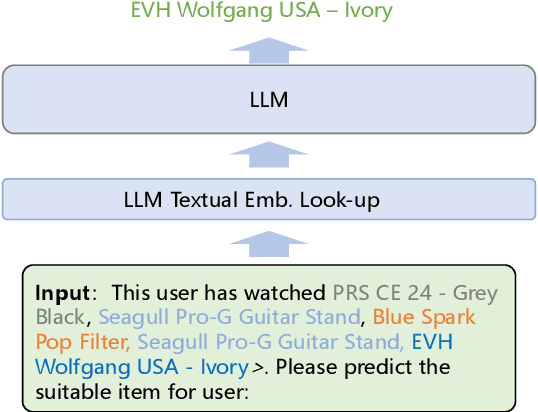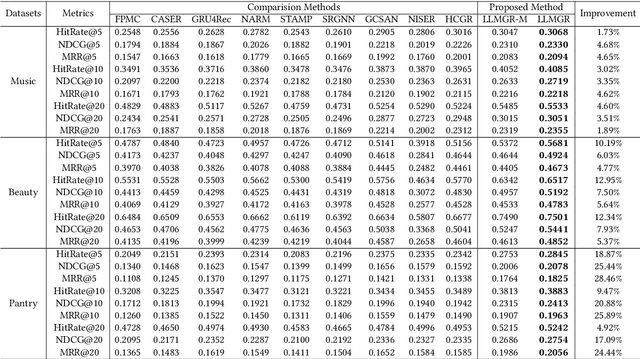Hongwei Cheng
Integrating Large Language Models with Graphical Session-Based Recommendation
Feb 26, 2024



Abstract:With the rapid development of Large Language Models (LLMs), various explorations have arisen to utilize LLMs capability of context understanding on recommender systems. While pioneering strategies have primarily transformed traditional recommendation tasks into challenges of natural language generation, there has been a relative scarcity of exploration in the domain of session-based recommendation (SBR) due to its specificity. SBR has been primarily dominated by Graph Neural Networks, which have achieved many successful outcomes due to their ability to capture both the implicit and explicit relationships between adjacent behaviors. The structural nature of graphs contrasts with the essence of natural language, posing a significant adaptation gap for LLMs. In this paper, we introduce large language models with graphical Session-Based recommendation, named LLMGR, an effective framework that bridges the aforementioned gap by harmoniously integrating LLMs with Graph Neural Networks (GNNs) for SBR tasks. This integration seeks to leverage the complementary strengths of LLMs in natural language understanding and GNNs in relational data processing, leading to a more powerful session-based recommender system that can understand and recommend items within a session. Moreover, to endow the LLM with the capability to empower SBR tasks, we design a series of prompts for both auxiliary and major instruction tuning tasks. These prompts are crafted to assist the LLM in understanding graph-structured data and align textual information with nodes, effectively translating nuanced user interactions into a format that can be understood and utilized by LLM architectures. Extensive experiments on three real-world datasets demonstrate that LLMGR outperforms several competitive baselines, indicating its effectiveness in enhancing SBR tasks and its potential as a research direction for future exploration.
Adaptive Pattern Extraction Multi-Task Learning for Multi-Step Conversion Estimations
Jan 23, 2023Abstract:Multi-task learning (MTL) has been successfully used in many real-world applications, which aims to simultaneously solve multiple tasks with a single model. The general idea of multi-task learning is designing kinds of global parameter sharing mechanism and task-specific feature extractor to improve the performance of all tasks. However, challenge still remains in balancing the trade-off of various tasks since model performance is sensitive to the relationships between them. Less correlated or even conflict tasks will deteriorate the performance by introducing unhelpful or negative information. Therefore, it is important to efficiently exploit and learn fine-grained feature representation corresponding to each task. In this paper, we propose an Adaptive Pattern Extraction Multi-task (APEM) framework, which is adaptive and flexible for large-scale industrial application. APEM is able to fully utilize the feature information by learning the interactions between the input feature fields and extracted corresponding tasks-specific information. We first introduce a DeepAuto Group Transformer module to automatically and efficiently enhance the feature expressivity with a modified set attention mechanism and a Squeeze-and-Excitation operation. Second, explicit Pattern Selector is introduced to further enable selectively feature representation learning by adaptive task-indicator vectors. Empirical evaluations show that APEM outperforms the state-of-the-art MTL methods on public and real-world financial services datasets. More importantly, we explore the online performance of APEM in a real industrial-level recommendation scenario.
 Add to Chrome
Add to Chrome Add to Firefox
Add to Firefox Add to Edge
Add to Edge